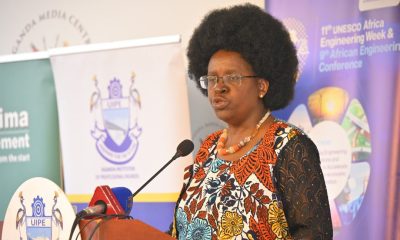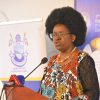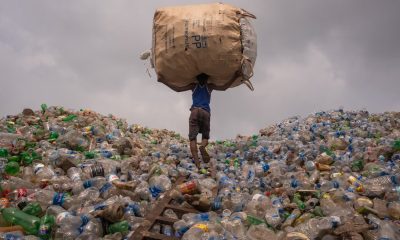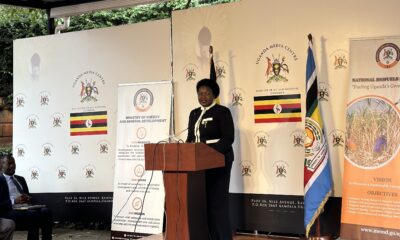human traffickingFeatures
What if most of Uganda’s cherished food originated elsewhere
Biosafety guru makes case for biotechnology law in Uganda
the Chairman of Uganda’s National Biosafety CommitteeBiotechnology and Genetically Modified Foods attract impassioned debates across Uganda. But very often, opponents of the modern agricultural breeding technology claim it will wipe out ‘their traditional foods and make them dependent on foreign multi-national seed corporations.
Dr. Charles Mugoya, the Chairman of the National Biosafety Committee (NBC) of the Uganda National Council for Science and Technology (UNCST) argues that what most people call their traditional food is actually not native to Uganda but is a result of years of constant improvement through conventional breeding by scientists in other countries.
In a conversation that starts with a discussion of the recent up-tick in pressure by anti-GMO activists to try to block yet again the enactment a regulatory regime on genetic modification for Uganda, Dr. Mugoya tells The Sunrise’s Henry Lutaaya that the opponents of biotechnology need to appreciate the history of food in Uganda as well as the changing fortunes for the country’s agriculture.
Qn.1 What are your views about the latest up-tick in pressure by the anti-GMO camp to frustrate the law?
Ans. It is unfortunate because what the bill tries to do is to put our house in order against unregulated activities. A country is like a house. You must have rules that guide whoever lives in that house and how it is accessed, otherwise you will have chaos.
What, I think, the anti-GMO people want is to leave this technology to be unregulated, which will expose us to exploitation by multi-national corporations which can bring here their commercially superior products and sell them to us.
So I think it’s very advisable for the government to look at this bill as an opportunity to regulate the conduct of biotechnology by our laboratories; to regulate the trade in biotechnology and to ensure safety. If you allow a situation where someone can sell you something that is not regulated, that creates safety problems.
Qn.2 There is concern in the mainstream scientific community that the spirit of the anti-biotech camp may result into a ban against research and products of biotechnology. As the chairman of the NBC, what do you think about these concerns.
Ans. The [opponents of biotechnology] are not well informed. But let me touch on the role of the National Biosafety Committee (NBC). The role of the NBC is to be the arm of government that regulates, supervises the industry to ensure there is no mischief as scientists do their work. This ensures safety and guards against exploitation. If you stop a law that will empower NBC, it’s like you’re working in a situation where there is no law and order.
And any society that has no law and order, is governed by jungle law. Researchers, who because of their knowledge, will start doing experiments in their labs without due regard to the environment and that can be very dangerous. Any technology has a good side and a bad side, and this calls for regulation to minimise the bad sides.
The NBC is the body that watches over and regulates all the activities of scientists. By blocking this law, you disempower the NBC which means that scientists whether local or from other countries can do anything.
Qn. 3 What can you say about the country’s capacity to regulate biotechnology?
Ans. Our capacity is very good. Uganda is ranked among the countries in Africa with the best capacity. We have well trained people in research in biotechnology development as well as regulation.
My self, I have experience regarding regulation of over 20 years. I started this thing in the national council for science and technology in 1996. So I am very experienced in my own right.
Last month, I was invited by the government of Lesotho to set up their National Biosafety System. I spent there a month. Imagine the government of Uganda has someone who is helping the government of Lesuthu to set up their national biosafety system. They trust Uganda more perhaps than their neighbours who have already commercialised GMO for several years.
And we have people who have very long experience in the area of biosafety. And the people who oppose this bill are lost to the fact that Uganda has educated so many people in this area. I participated in the drafting of the African Biosafety Model Law way back in 1998. Now the anti-GMO camp is saying that our bill is not compatible with the African Model Law. In fact our bill was premised on elements of the African model law.
Not all the elements of the model law were incorporated of course since it came before the Catagena protocol. Once the Catagena protocol was put in place, we became more open-minded.
No one should say we have no capacity. In fact we are very bold and we compete with all the giants worldwide.
We are even more educated by the sheer fact that we work in a more challenging environment in Africa. Any environment that challenges you, empowers you with more knowledge creation.
Qn. 4 What’s you view on claims that Europeans have a hidden motive in opposing the development of biotechnology in Africa and why?
Ans. I think the basis of this fear is that many people believe that Europe colonised Africa and they still want to exploit Africa. They still want to sell us a lot of their products. There are many companies that are looking for markets and Africa has this market. If we are trying to be self-reliant in Africa, and remember we have more resources than them, then this will cause those factories in Europe to close down. So Europe is not being honest. They go where their interests are.
They want to exploit us so that we can supply them organic foods. Remember that food in Europe is a luxury. They are not involved in the production of food but because our food in Africa is produced organically, it is much tastier than theirs. This does not mean that when you produce GM food, it is going to be less tastier because the environment is the same.
So the fears in Europe are also founded on wrong premises by people who are not sharp in science.
But I want to touch on three myths held by many people in Uganda, which I think can clarify issues on biotechnology.
Number one; There is a wrong belief that we have the best climate, the best soils and that we have the best food crops. Almost everybody believes that, but this has the potential of blindfolding us. It’s like someone telling you that you’re the brightest in class. You’re appetite for learning reduces. You will often hear opponents of biotechnology say that; Why do you want this technology when you have the best climate, the best soils and so on.
The question is; Do we still have the same climate in this era of climate change that is causing recurrent droughts and hunger in places like Teso?
People should realise that our capacity to remain the best has diminished. So we need something to take it up a bit.
Problem number two is that many people don’t know the story of where our foods come from and many people don’t know what it takes to produce food.
The foods we grow in Uganda, didn’t originate in Uganda except for one or two millet and sorghum. Maize didn’t originate in Uganda. It originated from Mexico. Coffee is not Ugandan either. We had wild coffee but it was not this type we’re growing here. The Robusta coffee we are growing in Uganda was introduced in 1921 by the colonialists. Bananas is not traditionally Ugandan food. Pumpkins is not Ugandan food.
Qn.5 What does this mean?
Ans. What this means is that the claims we make that Uganda is well endowed with a lot of traditional food are not true. The foods we call traditional food were bred from somewhere else and introduced into Uganda. Ugandan got a finished product and they don’t appreciate what it means to breed food.
If they knew they would appreciate biotechnology because it is easier to breed food with biotechnology than conventional means. Conventional breeding is like tearing a cloth but biotechnology is more precise like using a pair of scissors. Previously were just tearing but now we have the tools, the scissors to breed more disease or stress resistant foods and faster.
We need to appreciate that the Matooke we have today was the effort of breeders in Nicaragua, Mexico, India that resulted into the . The cassava we eat today was not bred in Uganda. Cassava was a root crop in the forests of Colombia. It was bred and brought here by the Portuguese in the 16th and 17th century in ships.
So most of the time, when people are discussing issues of biotechnology, they start with half the story.
The problem of biotechnology is that we have people who have never experienced hunger claiming to be talking on behalf of those that experience hunger everyday. For example the Parliamentarians who are refusing to pass the bill, many of them don’t know hunger and are blocking opportunities for millions of farmers to escape hunger.
The other very important thing that I want everyone to note is that once we start growing GMOs, we shall not stop growing the other things that we’ve been growing. If I want to grow my local maize, I will continue growing my local maize.
What I hear is that people are told that once GMOs are allowed, everybody who does not grow GMOs will be prosecuted. No. It’s like hospitals, since they came, they’ve not stopped us from going to the bush to pick our herbs? What we’re doing is to say that, Ok, let’s regulate the way people are treated in the hospital. But opponents are saying no no, for us we’re comfortable with herbs. But we’re saying there are risks with quark doctors and medicine in the hospital if don’t regulate.
The advantage with the GMOs is that if I have some extra money, I can go out and buy a hybrid so that instead of harvesting one sac [of maize] I get four sacs. GMO is just an added option. If I want to grow my bananas that don’t have Vitamin A, I can still do that and the bananas will not mix since there is no cross pollination in bananas.
Comments



























